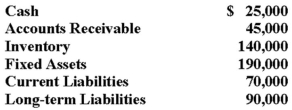A) current
B) debt to equity
C) return on equity
D) inventory turnover
Correct Answer

verified
Correct Answer
verified
True/False
The steps in the accounting cycle do not need to be followed in the order stated.Monthly financial statements can be prepared with a good amount of accuracy,prior to posting in the ledger or preparing the trail balance.
Correct Answer

verified
Correct Answer
verified
Multiple Choice
As Hector was packing to return to State University after his summer vacation,he realized that he owned many valuable things such as a laptop computer,a stereo system,and a DVD player.An accountant would list all of these as Hector's:
A) assets.
B) liabilities.
C) owners' equity.
D) intangibles.
Correct Answer

verified
Correct Answer
verified
True/False
Cash flow statements identify three sources of cash receipts and disbursements: Assets,liabilities and owners' equity.
Correct Answer

verified
Correct Answer
verified
True/False
Citizens and special interest groups often have interest in the information generated by government accounting.
Correct Answer

verified
Correct Answer
verified
Multiple Choice
Brianna is a bookkeeper for Monograms,Limited.She takes the firm's transactions and records them in a record book or computer program referred to as:
A) A credit account.
B) An asset database.
C) A journal.
D) A debit program.
Correct Answer

verified
Correct Answer
verified
True/False
Money received from tickets sold for the Rolling Stones concert is recorded as net income on the concert promoter's income statement.
Correct Answer

verified
Correct Answer
verified
True/False
An individual who provides accounting services to individuals and businesses on a fee basis is referred to as a private accountant.
Correct Answer

verified
Correct Answer
verified
Multiple Choice
The use of computerized accounting systems _____________.
A) makes it possible for most firms to operate without the expense of hiring or consulting with accountants
B) reduces the pressure on managers in making financial decisions
C) allows firms to generate financial information almost instantly and whenever the organization needs it
D) creates an environment in which accounting has become nothing more than glorified bookkeeping,as all accountants are required to do is enter data into the system and monitor the results the program generates
Correct Answer

verified
Correct Answer
verified
Multiple Choice
__________ is the accounting practice of recording each transaction in two places in the accounting journal.
A) Double-entry bookkeeping
B) Trial balancing
C) Account matching
D) Entry duplication
Correct Answer

verified
Correct Answer
verified
Multiple Choice
Similar to the example of FIFO and LIFO inventory accounting methods depicted in the Connecting with Small Business box titled,"LIFO or FIFO?" a college store purchased sweatshirts for the upcoming fall semester.Using the following data,where a total of 100 sweatshirts were purchased by the store and placed in inventory,select the correct statement from the following choices. 
A) FIFO would provide the least profit.
B) FIFO would provide the most profit.
C) LIFO or FIFO will produce the same amount of profit.
D) LIFO would provide the most profit.
Correct Answer

verified
Correct Answer
verified
Multiple Choice
Stockholders of the Sasha Deal Company are concerned about irregularities in the firm's accounting system.One approach to identify problems in the records of the company would be to have a(n) ________ performed.
A) internal audit
B) independent audit
C) unofficial audit
D) GAAP analysis
Correct Answer

verified
Correct Answer
verified
True/False
The basic earnings per share and the diluted earnings per share would have quite different values for a firm that relied heavily on preferred stock and convertible debt securities to acquire funds.
Correct Answer

verified
Correct Answer
verified
True/False
A bookkeeper's first task is to record the firm's transactions in a journal.
Correct Answer

verified
Correct Answer
verified
Multiple Choice
Once a trial balance has been prepared,the next step of the accounting cycle involves:
A) Posting the information to the correct ledger accounts.
B) Completing a balance sheet and ratio analysis.
C) Preparing financial statements such as the balance sheet,income statement,and statement of cash flows.
D) Classifying the transactions into logical categories.
Correct Answer

verified
Correct Answer
verified
Multiple Choice
A firm's efficient use of its assets in running the business is key to maintaining sufficient cash flow.Ratios that accountants utilize to measure the efficient use of assets are called ____________ ratios.
A) leverage
B) liquidity
C) activity
D) profitability
Correct Answer

verified
Correct Answer
verified
Multiple Choice
A basic difference between managerial accounting and financial accounting is that managerial accounting:
A) adheres to rules set by the GASB,while financial accounting uses a different group of rules set by the FASB.
B) involves the preparation of the balance sheet and income statement while financial accounting involves the preparation of the statement of cash flows.
C) handles recording and classifying information about transactions that have no direct financial impact on the firm,while financial accounting handles the recording and classifying of information about transactions that do have a financial impact.
D) provides information primarily intended for managers and others inside the company,while financial accounting provides information primarily intended for people outside the organization.
Correct Answer

verified
Correct Answer
verified
Multiple Choice
As a bank loan officer,you are considering a loan application by Peak Performance Sporting Goods.The company has provided you with the following information: Peak Performance's debt to owners equity ratio (rounded to the nearest tenth of a percent) is:

A) 45.4%.
B) 66.7%.
C) 112.5%.
D) 133.3%.
Correct Answer

verified
Correct Answer
verified
Multiple Choice
________ is the monetary value that is received for goods sold,services rendered and money received from other sources.
A) Revenue
B) Gross margin
C) Net income
D) Cost of goods sold
Correct Answer

verified
Correct Answer
verified
True/False
It is impossible to run a company effectively without the ability to read and understand basic accounting reports and financial statements.
Correct Answer

verified
Correct Answer
verified
Showing 341 - 360 of 382
Related Exams